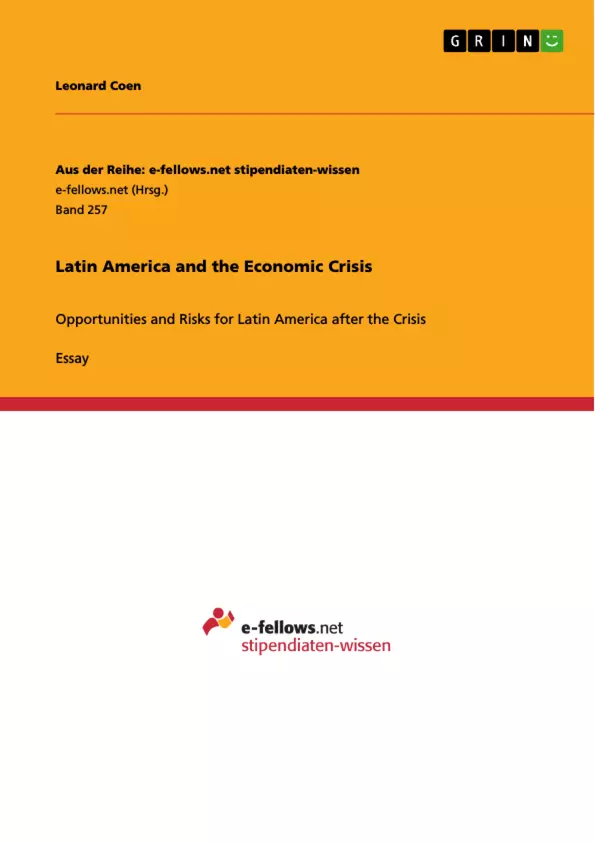The 2008 economic crisis has had profound economic and political impacts across the globe. Although every continent was affected somehow by the crash in 2008, the vigor of the impact and the subsequent recovery differed quite significantly throughout the world. A case-by-case analysis by regions is therefore necessary to draw conclusions from the past and generate assumptions on the future.
As illustrated in figure 1, world output was negative in 2009 as a consequence of the turmoil of 2008. Despite a global GDP decline of 2%, developing countries managed to keep growing at a reduced rate, meaning that the overall recession was largely driven by the developed countries (-4% in 2009).
Inhaltsverzeichnis (Table of Contents)
- The crisis and its impact
- Despite recovery important risks remain for Latin America
- The opportunities however are very convincing
Zielsetzung und Themenschwerpunkte (Objectives and Key Themes)
This analysis explores the opportunities and potential risks for Latin America within the current context of global economic crisis. The author examines the impact of the 2008 economic crisis on the region and analyzes its economic resilience and growth potential. The paper further investigates Latin America's evolving political landscape and its ability to reduce its dependence on the United States and diversify its international relations.
- The impact of the 2008 economic crisis on Latin America
- Latin America's economic resilience and growth potential
- The emergence of a multipolar world order and its implications for Latin America
- Latin America's evolving political landscape and its reduction of dependence on the United States
- The increasing importance of South-South cooperation and its impact on Latin America's development
Zusammenfassung der Kapitel (Chapter Summaries)
The first chapter analyzes the global economic crisis, highlighting its impact on both developed and developing countries. The author argues that while the crisis significantly affected developed countries like the US and Europe, Latin America, although not unaffected, demonstrated considerable resilience and experienced relatively strong economic growth in the aftermath of the crisis. The second chapter explores the risks that remain for Latin America despite the economic recovery. The author identifies a number of challenges, including the fragility of the global economy, the persistence of poverty and inequality in the region, and the potential rise of populist left-wing movements. The final chapter focuses on the opportunities for Latin America in the post-crisis era. The author argues that the region has the potential to become a new growth engine of the world, benefiting from the rise of emerging economies like China and India. The analysis concludes by exploring the growing importance of South-South cooperation and its impact on Latin America's development.
Schlüsselwörter (Keywords)
The paper focuses on the interplay between the global economic crisis, Latin America's economic performance, the emergence of a multipolar world order, the region's political landscape, and the growing importance of South-South cooperation. Key terms and concepts include: economic crisis, Latin America, BRIC countries, multipolar world order, South-South cooperation, economic dependence, political influence, global trade, foreign direct investment, and development models.
Frequently Asked Questions
How did the 2008 crisis affect Latin America?
While developed countries saw a 4% GDP decline in 2009, Latin American economies demonstrated significant resilience, continuing to grow at a reduced rate and recovering faster than many Western nations.
What are the remaining risks for the region?
Key risks include the fragility of the global economy, persistent poverty and inequality, and the potential political instability from populist movements.
What is "South-South cooperation"?
It refers to the increasing trade and political collaboration between developing nations (e.g., Latin America and China/India), reducing their traditional dependence on the United States and Europe.
Why is Latin America becoming a global growth engine?
Due to its vast resources, emerging middle class, and diversifying international relations, the region has high potential to attract foreign direct investment and drive global trade.
How has the political landscape shifted post-crisis?
There is a noticeable trend towards reducing economic dependence on the US and seeking a more multipolar world order where Latin American countries have more diplomatic influence.
- Arbeit zitieren
- Leonard Coen (Autor:in), 2011, Latin America and the Economic Crisis, München, GRIN Verlag, https://www.grin.com/document/179651



